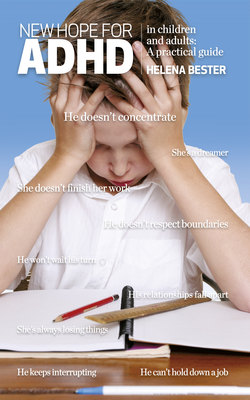Читать книгу New hope for ADHD in children and adults - Helena Bester - Страница 36
На сайте Литреса книга снята с продажи.
Irresponsibility
ОглавлениеAn underdeveloped sense of responsibility is often associated with ADHD sufferers. This late or partial development of a sense of responsibility concerns me more that any of the other symptoms and associated characteristics of ADHD. It is this aspect of the behaviour of ADHD sufferers that causes significant tension in the home. But I also believe that these children can be systematically taught to accept responsibility. The process must be a slow one – like climbing Kilimanjaro. I chose that example of Stephen Covey teaching his son to keep the garden tidy for a reason. It is clear that the way Covey taught his son, step by step, to complete a task, nurtured a sense of responsibility in him. You do not have to tackle every negative symptom or characteristic of your child separately. The way in which you communicate with your child can often address most problems effectively. The basic principles for communicating with ADHD sufferers will be discussed later.
As a parent you often hear criticism about your child’s lack of responsibility. As a teacher you often wonder where to draw the line. You already know that the ADHD child needs extra help and support. The question is: how much leeway should you allow, and when can you start expecting the child to take responsibility? I find the following guidelines useful:
•Add tasks for which the child is responsible, one by one.
•Guide the child slowly and step by step through the process of learning the new task.
•Remember that on average the ADHD child’s emotional development or, more specifically, manifested behaviour lags by up to 36 months (three years). The behaviour of the ADHD boy in Grade 9 therefore looks like the average Grade 6 boy’s behaviour. This gives you an idea of the behaviour you can expect from an ADHD child.
An inadequate sense of responsibility has serious implications for one’s whole life. Your career, relationships and social functioning are all negatively influenced by irresponsible behaviour. There are some disturbing statistics about ADHD sufferers doing the rounds, for example that 32-40 per cent do not complete their schooling and that 80 per cent underachieve, as already mentioned. As frightening are the studies showing that 40 per cent of teenage pregnancies occur among ADHD sufferers, that 50-70 per cent of them become involved in antisocial behaviour, and that the road accident figure is higher among ADHD sufferers.
There is more. I choose not to focus on it, but rather on the fact that 60-68 per cent of ADHD children do complete their schooling. Yes, these children do have a tendency to irresponsible and reckless behaviour. Be aware of this and realistic about it. Allowances must be made and a special effort made to teach responsibility. And in this process, keep in mind the underlying principle of the poem “Children learn what they live”.
Sometimes we may even envy the freedom ADHD children experience, and the behaviour of adults may contribute to the problem, as the following case study shows.
Leo is an ADHD sufferer in Grade 9 and his is a classic example of “like father, like son”. He’s a highly intelligent child. According to the IQ test he completed, his verbal and nonverbal scores are superior. He is therefore more intelligent than at least 91 per cent of fourteen-year-old boys in South Africa. But his school performance does not reflect this at all. His mother and I arranged for adaptations in evaluation methods in consultation with his school, and did our level best to bring about an improvement in Leo’s marks. A tutor was appointed to help him with his homework in the afternoons. His mother had to phone all over every day to keep things co-ordinated. In the meantime, the tutor (who also has many other responsibilities) was losing patience and becoming increasingly frustrated.
One day school closed early. There was a new movie on circuit and Dad decided he and his son were going to do some bonding. Mom was stressed out because the tutor was due to arrive an hour after the movie finished. “There’s nothing to worry about,” Dad insisted, “there’s more than enough time.” He would make sure the child was on time. He knew how important it was for Leo to study for the following day’s test. So they went to the movies. The movie finished. Father and son went for a quick milkshake. That was really their kind of movie! They talked and talked. Their cellphones were obviously still switched off. The tutor arrived. Mom phoned and drove around frantically. The tutor left. Dad and son enjoyed their milkshakes and conversation, and returned home much later, happy and relaxed, without a care in the world.
